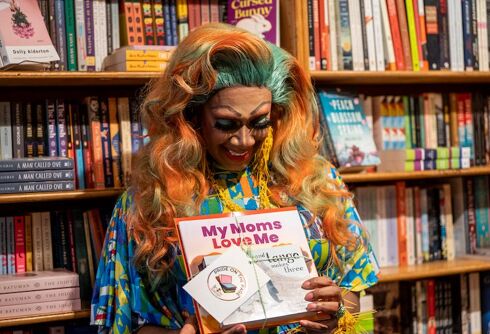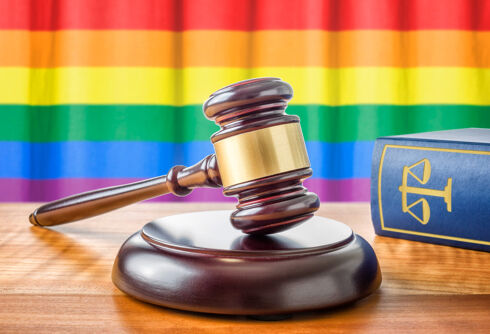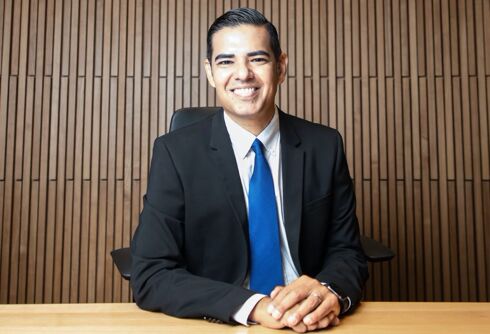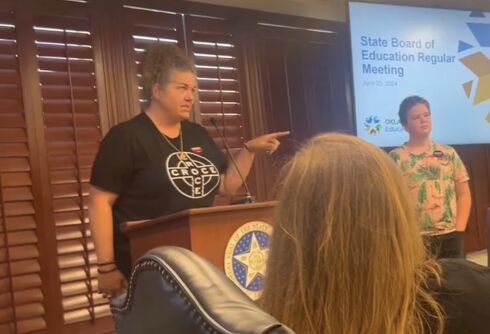The National Association of Intercollegiate Athletics (NAIA) has approved a ban on transgender women participating in women’s sports.
The organization’s Council of Presidents, which oversees student athletics at 249 small colleges, most of which are private institutions, voted 20–0 in favor of the new policy, which will take effect August 1, CBS News reports.
Related:
House GOP wants to pass another trans sports ban after passing one earlier in the year
They aren’t explaining how this bill is different from the one passed in April.
Under the new policy, transgender women and nonbinary students receiving masculinizing hormone therapy will be banned from participating in interscholastic competition on women’s teams — though students who are receiving hormone therapy will still be allowed to take part in workouts, practices, and other team activities. NAIA President Jim Carr told CBS Sports that students banned from women’s teams under the new policy would be able to participate in men’s events.
Stay connected to your community
Connect with the issues and events that impact your community at home and beyond by subscribing to our newsletter.
“With the exception of competitive cheer and competitive dance, the NAIA created separate categories for male and female participants,” the NAIA said in a statement. “Each NAIA sport includes some combination of strength, speed and stamina, providing competitive advantages for male student-athletes. As a result, the NAIA policy for transgender student-athletes applies to all sports except for competitive cheer and competitive dance, which are open to all students.”
Carr acknowledged that “there are a lot of different opinions out there” regarding trans women’s participation in women’s sports. But, he said, “We believed our first responsibility was to create fairness and competition in the NAIA.”
According to the Associated Press, about 125 NAIA schools are religiously affiliated. Seventeen of the 20 members of the organization’s Council of Presidents who voted for the new policy are from Christian schools. The NAIA is believed to be the first college sports organization to fully ban trans women from women’s sports.
The National Collegiate Athletes Association (NCAA), meanwhile, allows trans women to participate in women’s sports if they have been on hormone replacement therapy for at least one year and submit testosterone level tests ahead of both the regular season and championship events. Additional national and international sports governing body standards will be implemented beginning August 1 ahead of the 2024–2025 school year.
“College sports are the premier stage for women’s sports in America and the NCAA will continue to promote Title IX, make unprecedented investments in women’s sports and ensure fair competition for all student-athletes in all NCAA championships,” the organization said in a statement responding to NAIA’s new policy.
Higher education attorney and former Division I athlete Kasey Havekost told the Associated Press that she expects the NAIA’s policy to be challenged under Title IX, the federal law banning schools from discriminating on the basis of sex.
“I feel like at some point, it will have to be addressed,” Havekost said. “It’s a really complex issue. It might take a Supreme Court ruling.”
Under President Joe Biden, the U.S. Department of Education (DOE) proposed rule changes to Title IX last year that would allow K–12 schools and universities to limit the participation of transgender athletes in sports while also forbidding schools from banning trans athletes altogether. But as the Associated Press notes, the new rules have yet to be approved after the administration decided earlier this year to split them from other Title IX rule changes addressing campus sexual assault.
“You’re allowed to have separate but equal opportunities for women to compete,” NAIA’s Carr told CBS News, explaining why he believes the policy aligns with Title IX.
In a statement, Shiwali Patel, senior counsel at the National Women’s Law Center, called the policy “unacceptable and blatant discrimination that not only harms trans, nonbinary and intersex individuals, but limits the potential of all athletes.”
“It’s important to recognize that these discriminatory policies don’t enhance fairness in competition,” Patel said. “Instead, they send a message of exclusion and reinforce dangerous stereotypes that harm all women.”
Sasha Buchert, a senior attorney at Lambda Legal and director of the organization’s Nonbinary and Transgender Rights Project, slammed the NAIA for approving the policy “based on ignorance, prejudice, and ginned-up public hysteria” over trans women’s participation in women’s sports.
“Research has amply demonstrated the many benefits for students that flow from participation in school sports, from grade school through young adulthood. But, instead of standing up in support of transgender young people, the NAIA has simply turned its back on them—permanently depriving them of the benefits of participation,” Buchert said in a statement. “Would that they had the courage of victorious University of South Carolina women’s basketball coach Dawn Staley, who didn’t miss a beat in clarifying that transgender women should be able to play. Instead, the NAIA announcement sends a dangerous message, is inconsistent with the law and science, and undercuts the organization’s rich history of inclusion.”
Buchert noted that the NAIA’s policy and laws banning trans women and girls from participating in school sports target a disproportionately small number of athletes who are already vulnerable to discrimination. As the AP notes, a 2017 Human Rights Campaign survey suggested that less than 15 percent of transgender students participate in sports.
“It is unconscionable that an organization that touts its ‘strong history of advocacy’ has chosen to use its power to smack down, rather than lift up these vulnerable athletes,” Buchert said. “We urge the members of the NAIA to educate themselves further and to reconsider their position. And we sincerely hope that the much larger NCAA will not act to amplify the harm.”















